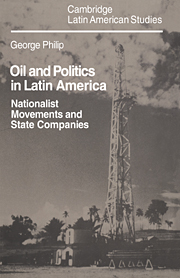Book contents
- Frontmatter
- Contents
- List of tables
- Preface
- Glossary
- Abbreviations
- Note on currencies and other units of measurement
- Maps: Latin America in 1920, 1940, 1960 and 1981; showing importing countries, exporting countries and countries self-sufficient in oil
- Introduction: The politics of oil in twentieth-century Latin America
- Part I The world oil environment
- Part II The major expropriations
- Part III The state oil companies
- 17 Pemex in Mexican politics 1938–79
- 18 The development of Petrobrás: oil company to conglomerate?
- 19 ypf 1932–1979: public enterprise or bureaucracy?
- 20 Petroperú 1968–80: achievements and hard lessons
- 21 ypfb and the development of oil in Bolivia
- 22 Petrovén: the birth of a giant
- 23 State oil companies in Latin America
- 24 Concluding reflections
- Notes and bibliography
- Index
- CAMBRIDGE LATIN AMERICAN STUDIES
19 - ypf 1932–1979: public enterprise or bureaucracy?
Published online by Cambridge University Press: 23 December 2009
- Frontmatter
- Contents
- List of tables
- Preface
- Glossary
- Abbreviations
- Note on currencies and other units of measurement
- Maps: Latin America in 1920, 1940, 1960 and 1981; showing importing countries, exporting countries and countries self-sufficient in oil
- Introduction: The politics of oil in twentieth-century Latin America
- Part I The world oil environment
- Part II The major expropriations
- Part III The state oil companies
- 17 Pemex in Mexican politics 1938–79
- 18 The development of Petrobrás: oil company to conglomerate?
- 19 ypf 1932–1979: public enterprise or bureaucracy?
- 20 Petroperú 1968–80: achievements and hard lessons
- 21 ypfb and the development of oil in Bolivia
- 22 Petrovén: the birth of a giant
- 23 State oil companies in Latin America
- 24 Concluding reflections
- Notes and bibliography
- Index
- CAMBRIDGE LATIN AMERICAN STUDIES
Summary
Unlike Pemex and Petrobrás, which have operated as largely autonomous public enterprises, YPF has generally been identified much more closely with the Argentine government. A large part of the reason for this has stemmed from the fact that there was never a real base for public enterprise desarrollismo in Argentina. Indeed, there has been little political continuity of any kind in that country and YPF has suffered many of the consequences of frequent political upheaval. While the effects of these political upheavals upon policymaking were by no means confined to YPF, the development of the state oil company was particularly difficult as a result of the early politics concerning oil in Argentina. As we have seen, the Radical Party was unable to consummate its relationship with oil nationalism in the 1920s, but instead retained its visions of a romantic past during later years when both the party and the issue had shown signs of age. For much of their period in office the Peronists, who replaced the Radicals as the most popular party in Argentina, were committed to ‘redistribution of income without growth, participation without social restraint and nationalism without efficiency’. Such policies, not surprisingly, were unhelpful to YPF. For Argentine conservatives, on the other hand, YPF was an embarrassment – an illegitimate offspring which had to be maintained in some fashion but which could not be allowed independence and still less a real part in national politics.
- Type
- Chapter
- Information
- Oil and Politics in Latin AmericaNationalist Movements and State Companies, pp. 401 - 428Publisher: Cambridge University PressPrint publication year: 1982



